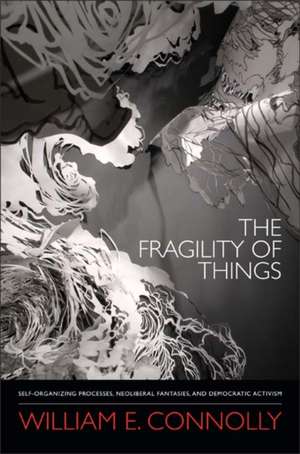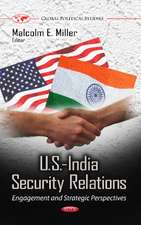The Fragility of Things – Self–Organizing Processes, Neoliberal Fantasies, and Democratic Activism
Autor William E. Connollyen Limba Engleză Paperback – sep 2013
| Toate formatele și edițiile | Preț | Express |
|---|---|---|
| Paperback (1) | 260.41 lei 6-8 săpt. | |
| MD – Duke University Press – sep 2013 | 260.41 lei 6-8 săpt. | |
| Hardback (1) | 605.17 lei 6-8 săpt. | |
| MD – Duke University Press – sep 2013 | 605.17 lei 6-8 săpt. |
Preț: 260.41 lei
Nou
Puncte Express: 391
Preț estimativ în valută:
49.84€ • 51.84$ • 41.14£
49.84€ • 51.84$ • 41.14£
Carte tipărită la comandă
Livrare economică 14-28 aprilie
Preluare comenzi: 021 569.72.76
Specificații
ISBN-13: 9780822355847
ISBN-10: 0822355841
Pagini: 256
Dimensiuni: 167 x 226 x 16 mm
Greutate: 0.36 kg
Ediția:New.
Editura: MD – Duke University Press
ISBN-10: 0822355841
Pagini: 256
Dimensiuni: 167 x 226 x 16 mm
Greutate: 0.36 kg
Ediția:New.
Editura: MD – Duke University Press
Recenzii
"The Fragility of Things represents an important turn in the thinking of William E. Connolly, a theorist whose work has a significant readership across the humanities and social sciences around the world. It introduces into the democratic and pluralistic ethos he has long advocated a new element: an informed sense of the 'fragility of things,' an awareness that human affairs are undertaken in a world of interacting systems of self-organization that place no special value on human flourishing or even survival. Connolly argues that an appreciation of the fragility of things must be incorporated into efforts to advance egalitarian, pluralist, and democratic values."Paul Patton, author of Deleuzian Concepts: Philosophy, Colonization, Politics"In this book, William E. Connolly enlists his unique perspective and voracious knowledge to examine neoliberalism's contribution to the fragility of things. And he incites us into activisms large and small. Connolly understands the need to show critically the fragility of things and to reveal the insistent ideologies that make life today more fragile than it needs to be. He also understands the need to counter those ideologies with something more than critique. I learned from reading The Fragility of Things. It pulled me into its vernacular: its language, its impulses, its questions are compelling. It was a pleasure to read: instructive, accessible, imaginative, and inspiring."Bonnie Honig, author of Antigone, Interrupted
"The Fragility of Things represents an important turn in the thinking of William E. Connolly, a theorist whose work has a significant readership across the humanities and social sciences around the world. It introduces into the democratic and pluralistic ethos he has long advocated a new element: an informed sense of the 'fragility of things,' an awareness that human affairs are undertaken in a world of interacting systems of self-organization that place no special value on human flourishing or even survival. Connolly argues that an appreciation of the fragility of things must be incorporated into efforts to advance egalitarian, pluralist, and democratic values." - Paul Patton, author of Deleuzian Concepts: Philosophy, Colonization, Politics "In this book, William E. Connolly enlists his unique perspective and voracious knowledge to examine neoliberalism's contribution to the fragility of things. And he incites us into activisms large and small. Connolly understands the need to show critically the fragility of things and to reveal the insistent ideologies that make life today more fragile than it needs to be. He also understands the need to counter those ideologies with something more than critique. I learned from reading The Fragility of Things. It pulled me into its vernacular: its language, its impulses, its questions are compelling. It was a pleasure to read: instructive, accessible, imaginative, and inspiring." - Bonnie Honig, author of Antigone, Interrupted
"The Fragility of Things represents an important turn in the thinking of William E. Connolly, a theorist whose work has a significant readership across the humanities and social sciences around the world. It introduces into the democratic and pluralistic ethos he has long advocated a new element: an informed sense of the 'fragility of things,' an awareness that human affairs are undertaken in a world of interacting systems of self-organization that place no special value on human flourishing or even survival. Connolly argues that an appreciation of the fragility of things must be incorporated into efforts to advance egalitarian, pluralist, and democratic values." - Paul Patton, author of Deleuzian Concepts: Philosophy, Colonization, Politics "In this book, William E. Connolly enlists his unique perspective and voracious knowledge to examine neoliberalism's contribution to the fragility of things. And he incites us into activisms large and small. Connolly understands the need to show critically the fragility of things and to reveal the insistent ideologies that make life today more fragile than it needs to be. He also understands the need to counter those ideologies with something more than critique. I learned from reading The Fragility of Things. It pulled me into its vernacular: its language, its impulses, its questions are compelling. It was a pleasure to read: instructive, accessible, imaginative, and inspiring." - Bonnie Honig, author of Antigone, Interrupted
Notă biografică
Cuprins
Prelude. 1775 1
1. Steps toward an Ecology of Late Capitalism 20
first interlude: Melancholia and Us 43
2. Hayek, Neoliberalism, and Freedom 52
second interlude: Modes of Self-Organization 81
3. Shock Therapy, Dramatization, and Practical Wisdom 98
third interlude: Fullness and Vitality 140
4. Process Philosophy and Planetary Politics 149
postlude: Role Experimentation and Democratic Activism 179
Acknowledgments 197
Notes 201
Bibliography 225
Index 233
1. Steps toward an Ecology of Late Capitalism 20
first interlude: Melancholia and Us 43
2. Hayek, Neoliberalism, and Freedom 52
second interlude: Modes of Self-Organization 81
3. Shock Therapy, Dramatization, and Practical Wisdom 98
third interlude: Fullness and Vitality 140
4. Process Philosophy and Planetary Politics 149
postlude: Role Experimentation and Democratic Activism 179
Acknowledgments 197
Notes 201
Bibliography 225
Index 233













